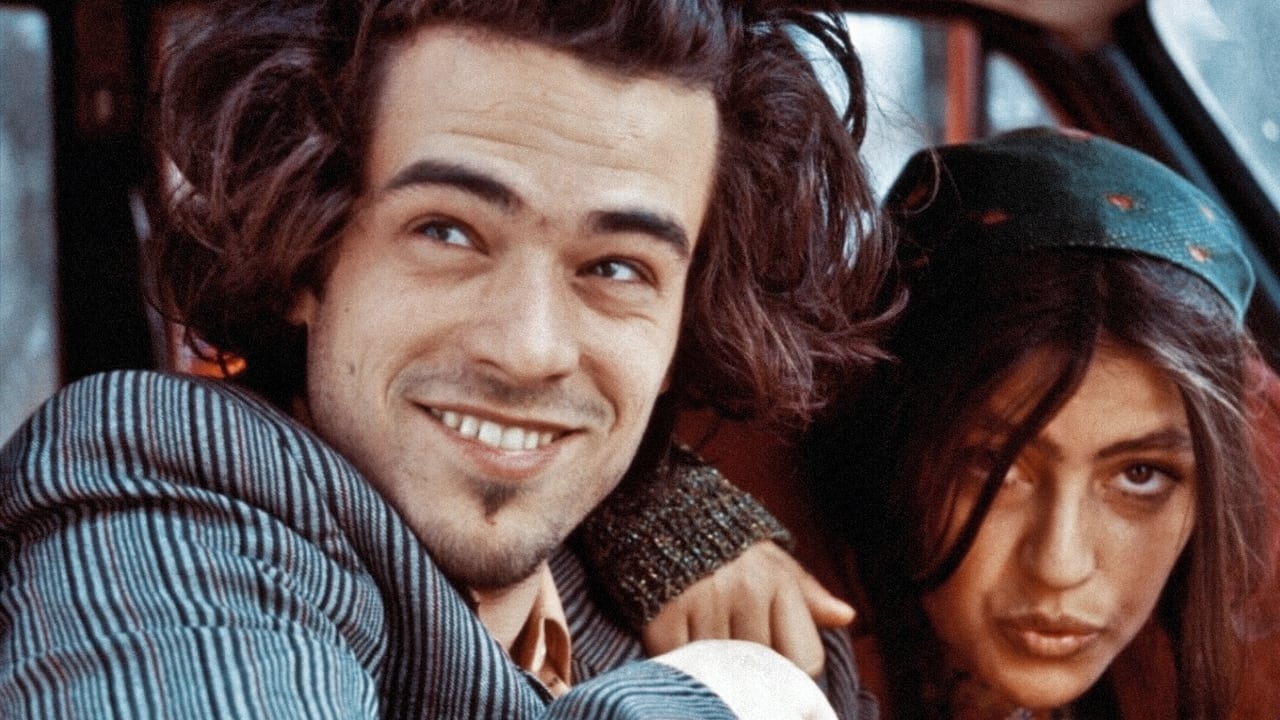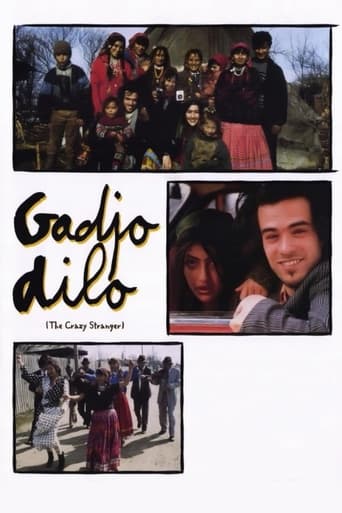

Although it has its amusing moments, in eneral the plot does not convince.
... View MoreWhile it doesn't offer any answers, it both thrills and makes you think.
... View MoreIt's the kind of movie you'll want to see a second time with someone who hasn't seen it yet, to remember what it was like to watch it for the first time.
... View MoreA film of deceptively outspoken contemporary relevance, this is cinema at its most alert, alarming and alive.
... View MoreGadjo Dilo is a much different film than Black Cat, White Cat, which also deals with Roma culture. Where Black Cat, White Cat was colorful and fun, Gadjo Dilo was gray and somber, but that suits its message much more appropriately. The movie focuses on a young man from France, Stephane, who while traveling around Europe befriends a group of Roma who are being discriminated against by the local villagers. In particular, he becomes very close to an older man named Isidor who is lamenting his son's arrest and enjoys drinking heavily. Isidor adopts the Frenchman as a surrogate son and allows him to stay in his house. Stephane's hobby is recording the musicians that he comes across on cassette tapes, and Romani prove to be a treasure trove for this. Initially Stephane has mentality of a tourist. He's not actually very interested in the people or their culture until he finds out that so many of them are musicians, and even then he is not genuinely interested in them. He's interested in their music as a novelty, something from a culture that isn't his own, but he doesn't actually have any appreciation for what the music means or the people that make it. That is until he begins a romance with Sabrina, a Roma woman who lives nearby, and he decides not to leave. As he stays with them he develops a deeper friendship with Isidor, and a more in depth understanding of the Romani. They become like his family. When Isodor's son is released from prison and then killed, Stephane has to face the devastating grief of the man he's become very close to. Isidor is playing the violin at a wedding when he is told of the news. At this wedding Stephane sees the attendees treating the gypsy band that features Isidor as little more than a novelty, much the same way he did when he was recording his tapes. He appears very obviously disgusted at this revelation and destroys all the tapes he had made while also doing a tribute dance to Isidor's loss. The movie is very critical of the dismissive attitude towards the Romani. It tries to show that the people behind the music are actually people and deserve more dignity and basic human courtesy than they receive. However, the movie itself does portray Isidor, the main Gypsy character other than Sabina, as a manipulative alcoholic and overall a fairly pathetic person. He is likable and nice, but he also at one points begs for sex and then throws a tantrum when he doesn't get his way. If he's supposed to represent an entire culture, this is not a very flattering portrayal. Gadjo Dilo wants to portray the Roma as an extremely underprivileged class that are often the victim of bigotry. It portrays them as being very pitiful and doesn't show much of a distinctive culture. Gadjo Dilo does have some philosophic substance in the way it addresses empathy and the way certain people are treated as novelties, but that message could apply to any number of ethnic groups. The movie is well-intentioned, but it's not a film that should be watched to gain a better understanding of Romani culture. They should be watched for their entertainment value.
... View MoreOh yes, I loved this movie very much. I have always loved the free-spiritedness of the gypsies and their sense of humor in this sense is just really a LOT of fun.I had already read about gypsies and was a little bit familiar with some of their ways, though certain things are different for groups in different locations of course. In this film you get to see something typical of gypsies mourning the death of a loved one or friend -- the chest-pounding dramatics, the drinking, the dancing -- although in the film this was just one person doing all of this and in the books I have read I would have expected to see a larger group moaning aloud, drinking and dancing all night. But still, so much the same...I love the way the movie begins. Any Puritans out there who don't like four-letter words or other sexual terms in movies, don't even watch this film because that happens in the beginning, middle and end. To me it was just perfect -- and hilarious too.In fact this movie now officially has one of my FAVORITE "love" or "seduction" scenes -- with the character Sabina first saying something IMDb would no doubt have to delete if I typed it, then Stephano saying something and the way they did it was SO cute. I can't explain.Oh, and I want to mention that the person who wrote the synopsis of the story for IMDb I believe said in error that at the end Stephano discovers that no one knew what he was saying all along. That is not what happened at all. There was a language barrier all along, but he was learning the language throughout the film and as Sabina warmed up to him the conversing got VERY good since she spoke French. I don't want to give away more, just to say I really love the film and will definitely want to see it again (and then probably again).
... View MoreGadjo Dilo stroked me in a most unconventional way. I saw it at a friend without knowing or expecting what it will be about. Very realistic and sincere, with raw images and beautiful shots, it simply shook me up. The way gypsies are presented is a true insight of their culture and way of living. The acting, done by amateurs at most, is flawless, especially by Izidor who delivers perfectly. Even if the story is hardly present, the movie doesn't need one as it slowly goesdeep with drama, comedy, ethnicity and music. Overall Gadjo Dilo (free translation Crazy Dude) is an unexpected gem from Tony Gatlif that is different from everything I've seen. Misto!
... View MoreI rented the movie wishing to see why would Vadim Tudor , the leader of the ultra-nationalist movement in Romania , be angry at a relatively unknown actress of Jewish descent but born in Romania , called Rona Hartner.I found this to be one charming movie but please, do not, by any means , take it as a documentary or search any sociological value in it. Otherwise you might be tempted to believe that the gypsies are a cute, merry, high-spirited people kept in cruel slavery by the oppressing Romanians. There are two sides to every story, remember that, and the movie does a wonderful job at presenting one and only one passionate side of it. Check Kusturica's movies for a more complete/impartial vision on gypsies , their joys and their troubles, without the romantic halo that Tony Gatlif casted upon them in his movie. Bear in mind that the Romanians (even as depicted in the movie) are as poor and oppressed as the gypsies, and , to spit it out, that the "the uncontaminated world of the gypsies","the gypsy culture" and "the chaotically beauty of gypsies" are to be placed in the context of active refusal and defiance of established modern society rules, an attitude that the majority of the gypsies still openly professes - an attitude which makes them at least undesirable for the majority in any of the countries they are living - and this is what Gatlif doesn't show and Kusturica rejoice in displaying.What's enjoyable here is the human story , at times joyful, at times moving and full of sorrow - a story that transcends the ethnic borders of the movie. As a Romanian who lived quite a while in a mixed nationality village and knows "the subject" quite well, I have to congratulate Rona Hartner on a perfect impersonation of a 'piranda', and Izidor Serban on a moving role that could have started a career.And I do understand why Vadim Tudor was angry at her ;-).
... View More